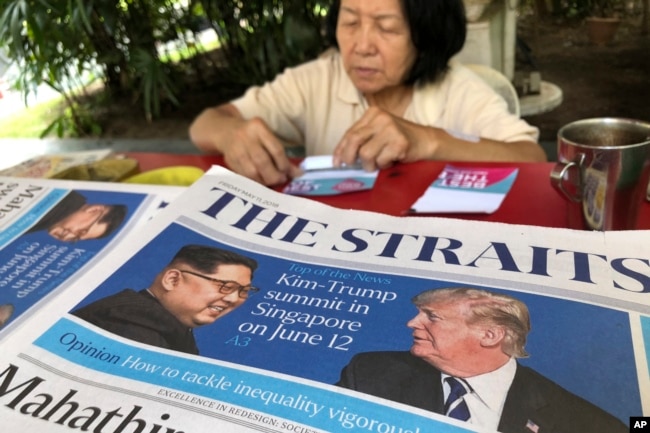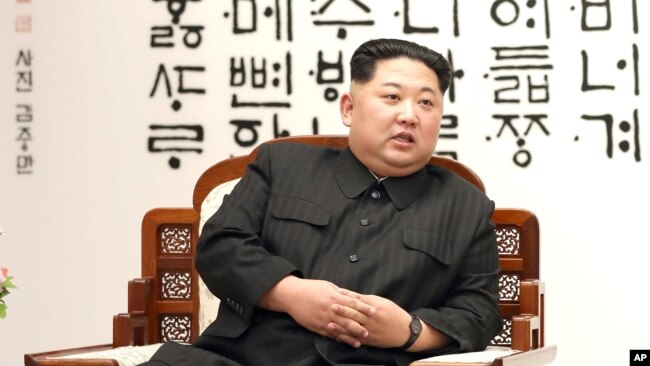
US Promises N. Korea Economic Investment After Denuclearization
Brian Padden/VOA News
“This will be Americans coming in, private sector Americans, not the U.S. taxpayer, private sector Americans coming in to help build out the energy grid. They need enormous amounts of electricity in North Korea; to work with them to develop infrastructure, all the things that the North Korean people need, the capacity for American agriculture to support North Korea, so they can eat meat and have healthy lives,” said Pompeo during an interview on the Fox News Sunday program.
Trump-Kim Summit
The Secretary of State recently returned from a trip to Pyongyang, where he meet with the North Korean leader to prepare for the upcoming Trump-Kim summit that will be held in Singapore on June 12. North Korea also released three American prisoners to Pompeo as a humanitarian gesture in advance of the summit.
The Trump administration is increasingly optimistic it can work out an agreement to dismantle the North’s nuclear program, its advanced ballistic missile arsenal, and chemical weapons capabilities, so as to no longer threaten the U.S. or it is allies.
During the recent North-South summit, Kim committed to the denuclearization of the Korean Peninsula, and indicated that he seeks an end to the severe U.S.-led sanctions banning 90 percent of North Korean trade that were imposed for his country’s repeated nuclear and missile tests.
“They obviously want to make concessions, a lot of concessions, but not as much as the American side hopes for,” said Professor Andrei Lankov, a North Korea economic analyst with Kookmin University in Seoul.
Pyongyang recently announced it would dismantle its nuclear bomb test site between May 23 and 25. However North Korea has argued for a more incremental denuclearization process that would provide immediate concessions for each denuclearization measure undertaken. It is not clear how Pyongyang and Washington can bridge the differences over their positions.
Investment uncertainty
It is also unclear if the U.S. private sector, or foreign investors in general, would be prepared to inject millions of dollars of investment into North Korea, once a nuclear deal is implemented and international sanctions are lifted.
“The administration is perhaps inflating expectations of what the North Koreans can expect in terms of private investment. Because banks, any financial institution, will still be long, long wary of the place,” said Andray Abrahamian, who was formally involved in developing business training programs for North Koreans, and is the author of the book, «North Korea and Myanmar: Divergent Paths».
Under Kim Jong Un, the communist state has implemented a number of market reforms that allow farmers to keep a portion of their crops and production, that permit state-owned enterprises to function as profit-oriented companies, and that overlook the growth of “grey market” traders of foreign and domestic goods.
The development of North Korea’s mineral exports, including billions of dollars worth of coal and iron, and capitalizing on the low wages in the impoverished state to expand clothing and light industry manufacturing, would be key attractions for foreign investment.
However, unlike communist China that successfully opened its economy to foreign investment and capitalism, North Korea remains an opaque business environment with unclear tax and investment laws, that views foreign involvement with suspicion, and restricts its own people from contacting the outside world.
“They are really reticent to allow mass use of the Internet, or make it easy for people to make international phone calls, or even travel abroad. So until those things are relaxed, it is hard to see the economy really taking off,” said Abrahamian.
Regional optimism
Still the prospect of peace in Korea has raised expectations that economic conditions in the region will soon improve.
China and South Korea also agreed to provide economic aid, if North Korea undertakes complete denuclearization.
The South Korean government has already suggested developing modern railway projects that would connect the Korean Peninsula to China and Russia. Shares of South Korea construction and railway firms have soared, and land prices are reportedly rising near the demilitarized zone border with the North in anticipation of increased cross-border business activities.
Lee Yoon-jee in Seoul contributed to this report.



